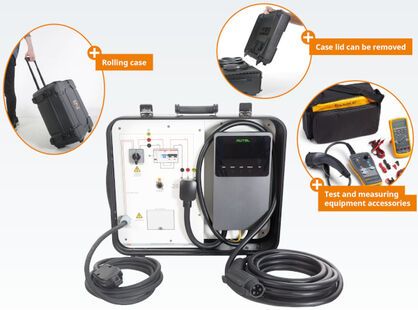ESM 8 EVCS Electric Vehicle Charging Station
ESM 8 EVCS Electric Vehicle Charging Station

A charging station, also called a charge point or Electric Vehicle Supply Equipment (EVSE), supplies power for charging plug-in electric vehicles like cars, trucks, and hybrids. These stations can be installed in public areas, private homes, and parking lots. With the rise of electric vehicles, Electric Vehicle Charging Stations (EVCS) have become vital to the infrastructure, offering different charging levels (Level 1, 2, and 3) with varying speeds. Wallboxes, compact high-performance stations for private and semi-public use, can be integrated into energy management systems and smart homes. The Lucas-Nuelle training system teaches the installation, safety testing, and code compliance of charging stations, making it easy to integrate them into smart building systems.
Wallboxes provide a safe and reliable EV recharging solution for homes, workplaces, retail stores, parking facilities, and the hospitality industry. They can be integrated into energy management systems, smart homes, photovoltaic systems, or smart meters. Regular electrical safety certification is required, and the equipment also trains personnel to inspect hardwired charging infrastructure and portable charging cables.
Training contents
- Understanding the structure and function of charging infrastructure systems
- Identifying the various types of charging columns and connection cables
- Determining the energy and power requirements for charging systems
- Learning about load management and assessing the energy and power requirements at the site
- Understanding the technical and legal requirements for installation
- Learning about the technical standards for connecting charging stations
- Testing communication signals (Cp) in mode A, B, C, and E
- Understanding the protective equipment of charging stations
- Learning about testing and maintenance according to national regulations
- Start/stop charging w/RFID Card, or NFC enabled smart watch/phone
- Troubleshooting potential issues
Hardwired charging infrastructure
- Learning project, general overview
- Adaptation of charging infrastructure to the upstream installation
- Electrical hazard
- Protective measures against electric shock
- Selection of components for charging infrastructure systems
- EV charging methods
- Inspection and testing of electrical charging stations in compliance with currently applicable standards
- Preparing an inspection report
- Setting up communication with the Wallbox
- Commissioning and configuration with the app
- Setting up various interfaces, WiFi, Bluetooth, LAN, RS485
- Troubleshooting wallboxes
- Documentation, hand-over and test report
Portable charging infrastructure
- Learning project, charging cable
- Selection of suitable charging cables for specific applications
- Relationship between cross-section, charging current and line designation/labelling
- Connector variants for charging cables
- Inspection and testing of charging cables as portable devices
- Use of emergency charging cables
- Special issues regarding the inspection and testing of emergency charging cables as portable devices
- Preparation of inspection and test reports for charging cables